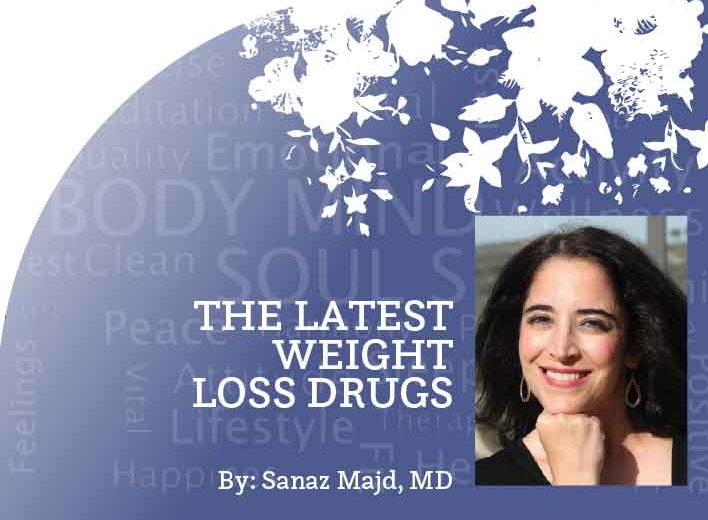By Sanaz Majd, MD

Weight gain — it is the main complaint I have been hearing repeatedly from patients during this COVID-19 quarantine. Sure we have more time to sit around, eat and snack now than ever before, and that might have a lot to do with it. But you do not want to miss these eight other sometimes missed medical conditions that can contribute to the “quarantine 15,” a term referring to the weight gained since this stay-at-home order went into effect.
Thyroid Disorder:
The thyroid is a small gland that sits in front of your neck. But do not let its size fool you. It helps regulate almost everything, including your metabolism. People with untreated hypothyroidism, which means they have decreased thyroid hormones, can gain weight.
This is typically due to a hereditary disorder called Hashimoto’s. It is an autoimmune disorder, which means the body erroneously considers parts of itself as “foreign” and triggers the immune system to attack it as a result. In Hashimoto’s, the immune system attacks the thyroid and hence decreases its hormone production.
Other symptoms of hypothyroidism, besides weight gain, include fatigue, constipation, depression, hair loss — basically, everything slows down. A simple blood test can rule this one out.
Diabetes/Prediabetes
Diabetics have something called “insulin resistance,” a topic I have reviewed in my prior YouTube videos. Insulin’s job is to help glucose enter the cell. But in diabetics these receptors (or doorways of sorts) do not function properly, and therefore insulin cannot do its job.
Because of this, the pancreas keeps pumping out more and more insulin in order to get that glucose into the cell. And insulin causes weight gain. Therefore, uncontrolled diabetics tend to be overweight and gain weight more easily.
A blood test called the “hemoglobin A1c” can diagnose it — it will measure the amount of glucose circulating in your body for the last three months and is now used as the primary test for diagnosis of diabetes and prediabetes, and also for surveillance of diabetes through time once diagnosed.
PCOS
Polycystic Ovarian Syndrome (PCOS) is a hormonal imbalance in women that also causes insulin resistance, just as in diabetics. This hormonal imbalance also causes irregular periods and sometimes acne, hirsutism (excess facial/body hair), scalp hair thinning, and weight gain. Its treatment can be complex, and may vary depending on the patient — but weight loss is key to its management and control.
There are blood tests to help support the diagnosis, but it is mostly a diagnosis based on symptoms and exam. That is, the labs can be normal and the patient can still have PCOS.
Menopause
Estrogen levels decline in menopause, and this causes a shifting of hormones and subsequently our adipose tissue, which is just a fancy word for fatty tissue, which we all have to some extent. Women report weight gain quite commonly during menopause.
Menopause is defined as one year without a period in females in their late 40’s to 50’s, and a blood test is often unnecessary. Average age of menopause is 51 in the U.S.
Medications
Certain medications can cause weight gain as a side effect. Here are a few examples:
- certain antidepressants
- hormonal contraceptives
- certain anti-seizure medications
- anti-psychotics used to treat bipolar disorder, schizophrenia, and sometimes severe anxiety/depression
- chronic steroids used to treat autoimmune conditions, such as rheumatoid arthritis and lupus
- Insulin and certain diabetes medications
If you are struggling with your weight, however, for your own safety make sure to always discuss your medications with your doctor before you decide to change or stop any treatment.
Pregnancy
I have seen this one before, and more than once, I must say. Women who do not menstruate regularly, or those who are postpartum and breastfeeding and may not have regular periods return yet, may come in with weight gain complaints. They may not know they are pregnant in the first trimester (or possibly even second trimester depending on the patient) and may gain weight through this time. It is almost always a surprise.
Stress
I don’t like to blame stress for every little thing. But cortisol levels rise during stress. And cortisol is a fat storing hormone. Therefore, people experiencing great stress may possibly gain weight more easily. Or indirectly, and perhaps more commonly, they may be snacking or paying less attention to their nutrition and health and thereby gaining weight in this way.
Snacks/Liquids
Staying home during this lockdown means easier access to food and more downtime to snack. But be careful — snacking in between meals can pose as a great source of extra unnecessary calories. Especially since most “snacks” are processed and high in carbohydrates — think chips, breads, sweets, etc.
Also be wary of any of your drinks with sugar. Sodas, juice, sweetened iced teas, gatorade, fancy coffee drinks, or simply sugar in your coffee, etc. may contain unnecessary amount of carbohydrates. Sometimes I see my patients lose weight simply by discontinuing their liquids with sugar. Opt for water with a squeeze of lemon, or sparkling water. Whatever you select, read the food label and make sure it states “0 grams” of carbohydrates.
In summary, no doubt that our lifestyle choices may account for the majority of weight we have gained during this unprecedented time. With gyms closed and social distancing requirements, we may be less physically active and perhaps less motivated when our daily routines have been disrupted. We also have easier access to our fridge and pantry, and more free time to occupy with snacking and indulging in food we may not typically consume as frequently.
Yet, keep in mind that other medical conditions and circumstances can help contribute to this “quarantine 15” for some people as well, with the above eight serving as some of the most common culprits. Which means that we may need to place greater effort in changing our lifestyle habits or perhaps may require modification to our medical management, depending on the specific medical condition affecting your health.
As always, stay safe and stay healthy.
Sanaz Majd, MD, is a board-certified family medicine physician who hosts a patient-education YouTube channel (@MajdMD), sharing home treatment tips for common medical conditions. You can also follow her on Facebook, Twitter, or Instagram: @SMajdMD.


















